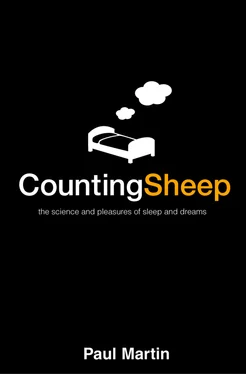The writer C. S. Forester charted the sleepiness of the long-distance mariner in his Hornblower novels, which relate the fictional Royal Navy career and Napoleonic War adventures of Horatio Hornblower, a character partly modelled on Admiral Horatio Nelson. In one story, the gallant Hornblower is exhausted from lack of sleep after a daring escape from France and a prolonged battle with pursuing enemy ships. Like Charles Lindbergh, Hornblower experiences the disturbing sensation that his mind has become disconnected from his body:
His voice sounded strange and distant in his own ears, like that of a stranger speaking from another room, as he issued his orders; the very hands with which he held the ropes seemed not to belong to him. It was as if there was a cleavage between the brain with which he was trying to think and the body which condescended to obey him.
Sleep deprivation was a fact of life for Hornblower’s real-life counterpart as well. When Horatio Nelson was commanding a Royal Navy warship he seldom had more than two hours of uninterrupted sleep and sometimes stayed on deck all night. However, like many leaders famed for coping with little sleep, Nelson had a well-developed ability to take catnaps during the day. He would nap in his cabin in a black leather armchair, his feet up on a chair. As we shall see later, a faculty for napping has enabled many high achievers to cope with meagre rations of night-time sleep.
Even in the twenty-first century, napping is a crucial skill for sailors – especially when sailing single-handed. In February 2001 the British yachtswoman Ellen MacArthur crossed the finishing line of the Vendée Globe boat race after 94 days alone at sea. She had travelled 24,000 miles across three oceans to become the fastest woman to sail single-handedly around the globe. For 13 weeks she had managed her 18-metre yacht in some of the world’s roughest seas by herself. The only way Ellen MacArthur could survive was to become a past master of napping, and divide her sleep into multiple brief naps. During the 94-day voyage she took 891 naps, each lasting on average 36 minutes, giving her a total of about five and a half hours of sleep a day. Even sleeping in such short bursts, MacArthur frequently had to rely on what she called her ‘sixth sense’ to wake her when something urgently required her attention.
He that sleeps feels not the toothache.
William Shakespeare, Cymbeline (1609–10)
Lack of sleep does far more than just make us feel sleepy, however: its tentacles reach out and twist our emotional, cognitive and physical states. One of the first casualties is mood. Tired people are emotionally less resilient and more prone to irritation or sadness. Tiredness also impairs our social and emotional skills, with potentially damaging consequences for personal relationships. A tired person can be physically present but psychologically and emotionally absent. In The Screw-tape Letters , C. S. Lewis imagines an experienced devil instructing his neophyte nephew on how to corrupt a young human. The best way, he advises, is through fatigue:
The paradoxical thing is that moderate fatigue is a better soil for peevishness than absolute exhaustion … It is not fatigue simply as such that produces the anger, but unexpected demands on a man already tired.
After a night without sleep, healthy people exhibit clear disturbances in mood, which are characterised by irritability, tension and reduced vigour. These symptoms normally evaporate after a good night’s slumber. Sleep-deprived people, like drunks, lose their social inhibitions and behave in inappropriate ways; they are prone to outbursts of childish humour, which others around them do not always find hilarious. (And strangely, for reasons that remain unclear, acute sleep deprivation can also have the counterintuitive effect of stimulating the libido.)
Severe sleep deprivation can induce feelings of persecution and mild paranoia. It is well known among sleep scientists that the volunteers who take part in their sleep-deprivation experiments often become irritable and impatient. Some subjects become slightly paranoid, convinced that the researchers and fellow volunteers are plotting against them. In rare instances, exhaustion can provoke more dramatic changes. In one documented case, a previously healthy man became psychotic after four nights of badly disrupted sleep and believed he was the Messiah.
Chronic sleep deprivation – that state of never getting quite enough sleep, day in day out, over a prolonged period – is far more common in everyday life than the acute deprivation that comes from having no sleep at all for one or two nights. And chronic sleep deprivation can have just as much cumulative impact, leaving even the saintliest person with a shorter fuse. The writer John Seabrook described the debilitating fatigue that goes with having a small baby like this:
The burning eyes; the band of fatigue that tightens around the skull, a sensation some liken to the feeling that you’re always wearing a hat; the irritation – at each other, at friends, at the cat’s water bowl, which I kept kicking by accident …
Lack of sleep and tiredness are obviously not wholly responsible for the tetchiness, aggression and petty violence of everyday life, but it is a racing certainty that they contribute towards making the world a nastier place. Conversely, there is little doubt that good sleep makes us feel better. In one study, researchers issued volunteers with pocket computers on which they logged their sleep patterns, moods and social interactions over a two-week period. The results showed that going to sleep earlier in the evening was consistently associated with better mood and better social interactions the following day.
Tired people are stupid and reckless
Fatigue makes women talk more and men talk less.
C. S. Lewis, The Screwtape Letters (1942)
Besides making us grumpy and poor company, sleep deprivation impairs our mental abilities in many subtle and not-so-subtle ways. In brief, tired people are stupid and reckless. Sleep deprivation damages our ability to perform tasks that require attention, thought, judgment, memory, social skills or communication skills – which covers the ground fairly comprehensively. Tired people also seem to lose sight of the consequences of their actions, liberating them to do silly and sometimes catastrophic things: the Chernobyl and Exxon Valdez disasters were just two examples.
Even modest sleep loss will measurably reduce your mental performance. After one night without sleep, you will have slower reactions, make more mistakes and find it harder to maintain attention. Unsurprisingly, two or three days of sleep deprivation produce even bigger impairments. Young adults are no more resistant than older people. If anything, they are more vulnerable. When researchers compared the consequences of one night of total sleep deprivation on healthy 80-year-olds and 20-year-olds, they recorded larger disturbances in the mood and cognitive performance of the younger subjects.
Reducing someone’s sleep for several nights in a row can undermine their performance just as much as completely depriving them of sleep for one or two nights. When scientists limited healthy young adults to an average of only five hours’ sleep a night for a week, the subjects became progressively sleepier and their performance deteriorated significantly. Two full nights of catch-up sleep (equivalent to a restful weekend) were needed to reverse the decline.
The armed forces have understandably maintained a long-standing interest in how well people hold up when they are deprived of sleep, as often happens in conflict. Experience shows that soldiers can continue to perform reasonably well after days of sleep deprivation under combat conditions, buoyed up by adrenaline, physical exertion and strong motivation. With sufficient stimulation and will power, military personnel can usually keep going without sleep for three or four days before they keel over. In one study, for example, men were assessed throughout a strenuous combat training course lasting several days. Some of the trainees were allowed no sleep at all, while others were permitted a few hours in the middle of the course. All the men displayed a substantial deterioration on measures of mood, vigilance and reaction time, with those who got no sleep performing even worse than those who got some. By the end, the trainees who had not slept at all were suffering from clinical symptoms including sensory disturbances.
Читать дальше












